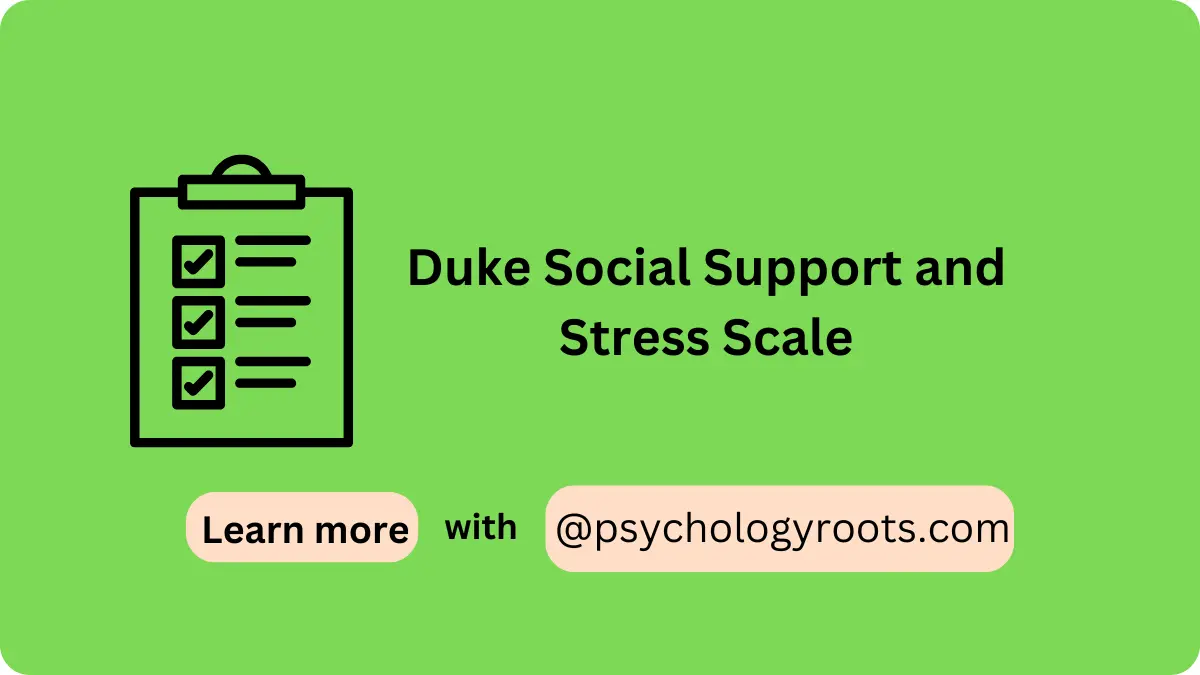Table of Contents
Duke Social Support and Stress Scale
Here in this post, we are sharing the “Duke Social Support and Stress Scale”. You can read psychometric and Author information. We have thousands of Scales and questionnaires in our collection (See Scales and Questionnaires). You can demand us any scale and questionnaires related to psychology through our community, and we will provide you with a short time. Keep visiting Psychology Roots.
About Duke Social Support and Stress Scale
Scale Name
Duke Social Support and Stress Scale
Author Details
George R. Parkerson
Translation Availability
English

Background/Description
The Duke Social Support and Stress Scale (DUSOCS), developed by George R. Parkerson in 1989, is a 24-item self-administered or interviewer-administered scale designed to measure perceived support and stress from family and nonfamily relationships in family practice settings. Published in Journal of Family Practice (1989), it examines the family environment’s role in health outcomes, focusing on subjective perceptions of supportiveness and stressfulness. The DUSOCS includes 12 support items and 12 stress items across six family categories (e.g., spouse, parents) and four nonfamily categories (e.g., friends, coworkers), plus two items identifying the most supportive and stressful relationships. It is used to identify individuals at risk of social isolation and study social determinants of health.
Each item is rated on a 3-point scale (0 = none, 1 = some, 2 = a lot; “no such person” or blank = 0). Scores are calculated for family support (sum of 6 items + 2 if family member is most supportive, divided by 14, scaled to 0–100), nonfamily support (sum of 4 items + 2 if nonfamily member is most supportive, divided by 10, scaled to 0–100), family stress, and nonfamily stress. Total support and stress scores sum raw scores, divide by 22, and scale to 0–100, with higher scores indicating greater support or stress. The DUSOCS was validated with 249–314 ambulatory patients (mean age ≈ 30–65 years, mixed gender, U.S.-based), correlating with family strength (r = 0.43–0.51) and health outcomes (r = -0.32 to -0.44). It is used in clinical psychology, family medicine, and public health. Access is available via Duke University (healthmeasures.mc.duke.edu) with permission.
Administration, Scoring and Interpretation
- Obtain the DUSOCS from Parkerson et al. (1989) or Duke University (healthmeasures.mc.duke.edu), ensuring ethical permissions.
- Explain to participants (adults 18+ in family practice or general population) that the scale assesses support and stress from relationships, emphasizing confidentiality and voluntary participation.
- Administer the 24-item scale via self-report or interview in clinical or research settings, rating current perceptions of support and stress.
- Estimated completion time is 5–10 minutes.
- Ensure a private, supportive environment; provide mental health or social support resources (e.g., counseling services) and adapt for accessibility (e.g., large print, simplified instructions) if needed.
Reliability and Validity
The DUSOCS demonstrates moderate psychometric properties (Parkerson et al., 1989). Two-week test-retest reliability (N not specified) ranges from r = 0.40 (family stress) to 0.76 (family support), with nonfamily support (r = 0.67) and nonfamily stress (r = 0.68). In a larger sample (N = 314), test-retest correlations are 0.27–0.58 for stress and 0.50–0.73 for support. Six-day intraclass correlations are 0.92 (self-administered) and 0.80 (interviewer-administered). Internal consistency is moderate (Cronbach’s alpha = 0.53–0.70).
Convergent validity is supported by correlations with Olson’s Family Strength measure (r = 0.43–0.51) and intrafamily/marital strain (r = 0.33–0.45, N = 249). Family stress correlates with Duke-UNC Health Profile symptom status (r = -0.32) and emotional function (r = -0.44). Construct validity is evidenced by family stress predicting higher healthcare use over 18 months (N = 314). Factor analysis identifies two factors: confidant and affective support. Discriminant validity shows low correlations with demographic variables. Pairing with the MOS Social Support Survey or Duke-UNC Functional Social Support Questionnaire enhances comprehensive assessment.
Available Versions
24-Items
Reference
Parkerson, G. R., Jr, Broadhead, W. E., & Tse, C. K. (1991). Validation of the Duke Social Support and Stress Scale. Family medicine, 23(5), 357–360.
Important Link
Scale File:
Frequently Asked Questions
What does the Duke Social Support and Stress Scale measure?
It measures perceived support and stress from family and nonfamily relationships.
Who is the target population?
Adults (18+) in family practice or general population for health research.
How long does it take to administer?
Approximately 5–10 minutes.
Can it inform interventions?
Yes, it identifies social isolation and stress to guide family medicine interventions.
Disclaimer
Please note that Psychology Roots does not have the right to grant permission for the use of any psychological scales or assessments listed on its website. To use any scale or assessment, you must obtain permission directly from the author or translator of the tool. Psychology Roots provides information about various tools and their administration procedures, but it is your responsibility to obtain proper permissions before using any scale or assessment. If you need further information about an author’s contact details, please submit a query to the Psychology Roots team.
Help Us Improve This Article
Have you discovered an inaccuracy? We put out great effort to give accurate and scientifically trustworthy information to our readers. Please notify us if you discover any typographical or grammatical errors.
Make a comment. We acknowledge and appreciate your efforts.
Share With Us
If you have any scale or any material related to psychology kindly share it with us at psychologyroots@gmail.com. We help others on behalf of you.